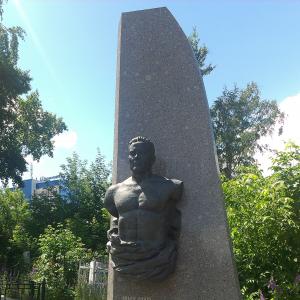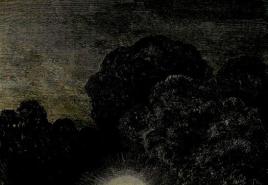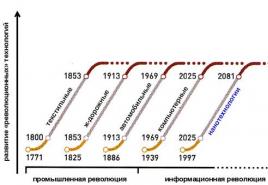Sholokhov's works list of the most famous. Works of Sholokhov
ILF Ilya (real name and surname - Ilya Arnoldovich Fainzilberg) (October 4, 1897, Odessa - April 13, 1937, Moscow), writer. Son of a bank employee. He received his education at the Odessa Technical School. He worked at an aircraft factory and collaborated on a humor magazine. In 1923 he moved to Moscow as a journalist. Co-author E. Petrova. Died of tuberculosis.
ILF Ilya(real name - Ilya Arnoldovich Faizilberg) (1897 - 1937);
PETROV Evgeniy(real name - Evgeny Petrovich Kataev) (1903 - 1942) - satirical writers, authors of novels, short stories, feuilletons and essays written together.
Ilf was born on October 3 (15 NS) in Odessa in the family of a bank employee. In 1913, after graduating technical school, began his career, often changing places of work: a drawing office, a telephone exchange, an aircraft factory. He worked as a statistician, editor of the humorous magazine Syndetikon, in which he published his poems under a female pseudonym, and accountant. In 1923 he became a professional writer. Having moved to Moscow, he constantly worked for the Gudok newspaper, but published his essays and feuilletons in various publications. Already in the processing of Rabkor's letters, Ilf's penchant for satire was evident. The result of a business trip to Central Asia a series of essays "Moscow - Asia" (1925) appeared. I Petrov was born on November 30 (December 13, 2010) in Odessa in the family of a history teacher. After graduating from a classical gymnasium in 1920, he began working as a correspondent for the Ukrainian Telegraph Agency, then as a criminal investigation inspector. In 1923 he moved to Moscow, where he continued his education and took up journalism. Worked in newspapers and humor magazines, published several books humorous stories. Petrov's feuilletons were also published in Gudka.
In 1925, the future co-authors met, but only a year later their joint activities began, since Petrov had to serve in the army. The first significant collaboration between Ilf and Petrov was the novel “The Twelve Chairs,” published in 1928 in the magazine “30 Days,” which immediately won reader recognition, but was received coldly by critics. The book of young writers was supported by V. Mayakovsky.
In the 1920s, a number of feuilletons and stories appeared, written jointly, in Pravda and Literaturnaya Gazeta.
In 1931, the second novel by Ilf and Petrov, “The Golden Calf,” was published, warmly received by critics, receiving rave reviews from M. Gorky, A. Zoshchenko, A. Barbus.
In 1935, the writers traveled to the United States, later writing the book One-Storey America (1936). Ilf's disease (pulmonary tuberculosis), aggravated during travel time, ended with his death on April 13, 1937.
After Ilf's death, Petrov wrote several film scripts: "Air Cabby" (1943), "Anton Ivanovich is Angry" (1940), together with G. Moonblit - "Musical History".
With the beginning Patriotic War Petrov becomes a war correspondent for Pravda and Informburo, and visits many sectors of the front. The result of these impressions was the book "Front Diary". On July 2, 1942, E. Petrov, returning by plane to Moscow from besieged Sevastopol, died.
Materials used from the book: Russian writers and poets. Brief biographical dictionary. Moscow, 2000.
Petrov Evgeniy (real name and surname - Evgeniy Petrovich Kataev) (11/17/1903, Odessa - 7/2/1942), writer. Brother V.P. Kataeva. He worked as a reporter at the Ukrainian Telegraph Agency, then as an investigator in the criminal investigation department. Collaborated in humor magazines. In 1923 he moved to Moscow, where he met I. Ilf. Together with him, he wrote the extremely popular novels “The Twelve Chairs” (1928) and “The Golden Calf” (1931), in which they mocked, as is commonly believed, Soviet reality. At the same time, these novels appealed to the majority of the population not because of this, but because of their sophisticated mockery of intellectual workers, clergy, nobles, etc. After Ilf's death (1937), he joined the Pravda newspaper and never wrote a single good work. In 1940 he joined the CPSU(b). During the Great Patriotic War, correspondent for the newspapers "Pravda", " Red Star", Sovinformburo. In May 1942, he arrived in besieged Sevastopol on the destroyer Tashkent. The plane on which Petrov was returning from Sevastopol to Moscow crashed and the entire crew died.
Materials used from the book: Zalessky K.A. Stalin's Empire. Biographical encyclopedic dictionary. Moscow, Veche, 2000
May 23 2018
Name: Golden calf
Format: MP3, 44.1 kHz, 192 kbps
Executor: E. Vesnik, O. Basilashvili, V. Nevinny
Playing time: 03:20:51
Description: If you are faced with the acute question “How to become a millionaire?”, then here is a million witty tips straight from the country of the Soviets, from the masters of adventurous satire and enterprising humor, the famous writers Ilf and Petrov.
An audiobook about a calf, but not an ordinary one, but a “golden one” - this is also a fascinating excursion into the original aesthetics Russian life The 30s of the last century, and the brilliant, child-like free vision of the world by the authors, and the incredibly talented and passionate play of wonderful artists.
May 23 2018
 Name: 12 chairs
Name: 12 chairs
Format: MP3, 44.1 kHz, 192 kbps
Executor: E. Vesnik, O. Basilashvili, Y. Yakovlev, E. Evstigneev
Playing time: 04:38:12
Description: The former rich man, socialite and “leader of the nobility” Ippolit Vorobyaninov after the revolution became an ordinary clerk at the registry office in a small town. He has not yet forgotten his old habits and often dreams of his former life. One day, the measured course of life is disrupted - the dying mother-in-law told Vorobyaninov about the enormous wealth that she hid during the revolution in one of the chairs of the living room set. He immediately rushes to search, together with the “great schemer” he met, a swindler and lover of banknotes Ostap Bender. Finding the treasure will not be easy, but Bender and Vorobyaninov, overcome by a passion for wealth, will stop at nothing...
Jul 23 2017
 Name: House with pretzels
Name: House with pretzels
Format: MP3, 44.1 kHz, 96 kbps
Executor: Vyacheslav Gerasimov
Playing time: 17:58:13
Description: In a small house where four families live, there is alarm: Visily Ivanovich Loshad-Przhevalsky has rented out a room to a strange tenant, Kota Lokhvitsky. In the very first days, the tenant insured his property against fire for 1000 rubles...
Jun 11 2017
 Name: One thousand and one days, or the new Scheherazade
Name: One thousand and one days, or the new Scheherazade
Format: MP3, 44.1 kHz, 64 kbps
Executor: Alexander Bordukov
Playing time: 01:44:28
Description: Difficult times are coming in the Moscow office for the preparation of Claws and Tails. As a result of the “battle of the titans” - the head of the office Pavel Venediktovich Fanatyuk and his deputy Satanyuk - Fanatyuk won. He decided to fire all of his opponent’s supporters, including the clerk of the general office, Scheherazada Fedorovna Shaitanova. In order to avoid being fired, she begins to tell her boss different entertaining stories from the life of the office. Whether this cunning plan will help Scheherazade retain her position, you will find out by listening to the audiobook, but we will note on our own that after some, very short time, Fanatyuk was appointed to the city of Kolokolamsk as a city photographer. But this is a completely different story, which is told in the audiobook “Extraordinary Stories from the Life of the City of Kolokolamsk.”
Apr 02 2016
 Name: One-story Moscow
Name: One-story Moscow
Format: MP3, 44.1 kHz, 192 kbps
Executor: Vladimir Samoilov, Ilya Prudovsky
Playing time: 05:13:25
Description: We present to your attention an audiobook containing fascinating stories and feuilletons by famous authors - Ilya Ilf and Evgeny Petrov. Ilya Ilf and Evgeny Petrov are known primarily as the authors of the famous novels “The Twelve Chairs” and “The Golden Calf.” However, in the creative heritage of writers there are also dozens of stories, feuilletons, anecdotes, satirical short stories and funny notes “about all sorts of oddities and blunders”, in which a kind smile is combined with caustic sarcasm, sharp satire with soft irony, caustic parody with cheerful mischief.
Feb 20 2016
 Name: Extraordinary stories from the life of the city of Kolokolamsk
Name: Extraordinary stories from the life of the city of Kolokolamsk
Format: MP3, 44.1 kHz, 320 kbps
Executor: Vladimir Vishnevsky
Playing time: 03:42:27
Description: The brilliant satirical short stories “Extraordinary Stories from the Life of the City of Kolokolamsk” tell about the everyday life of the city invented by Ilya Ilf and Yevgeny Petrov, whose inhabitants, typical Soviet inhabitants, regularly follow the directives of their superiors, implementing new ideological trends and, as often happens, out of stupidity distorting them to the point of absurdity.
Dec 04 2013
 Name: Golden calf
Name: Golden calf
Format: MP3, 44.1 kHz, 128 kbps
Executor: Vladimir Samoilov
Playing time: 14:06:11
Description:“The Golden Calf” is a truly cult book. A book that everyone loves and remembers: adults and children, academics and schoolchildren... A book that is quoted at every step. “The Golden Calf” is the golden fund of Russian literature. The co-authors of “The Golden Calf” are fellow Odessa residents. Ilf is the pseudonym of the poet and journalist Ilya Arnoldovich Fainzilberg. Petrov is the pseudonym of former employee of the Odessa criminal investigation department Evgeny Petrovich Kataev
ILF AND PETROV– Ilf, Ilya Arnoldovich (1897–1937) (real name Fainzilberg), Petrov Evgeniy Petrovia (1903–1942) (real name Kataev), Russian prose writers.
Ilf was born on October 4 (16), 1897 in Odessa in the family of a bank employee. In 1913 he graduated from technical school, after which he worked in a drawing office, at a telephone exchange, at an aircraft factory, and at a hand grenade factory. After the revolution, he was an accountant, a journalist at YugROSTA, an editor in humorous and other magazines, and a member of the Odessa Union of Poets. In 1923 he came to Moscow and became an employee of the Gudok newspaper, with which M. Bulgakov, Y. Olesha and other subsequently famous writers collaborated in the 1920s. Ilf wrote materials of a humorous and satirical nature - mainly feuilletons. Petrov was born on November 30, 1903 in Odessa in the family of a teacher. Became the prototype for Pavlik Bachey in the trilogy of his older brother Valentin Kataev Waves of the Black Sea. In 1920 he graduated from a classical gymnasium and became a correspondent for the Ukrainian Telegraph Agency. In the autobiography of Ilf and Petrov (1929) it is said about Petrov: “After that, he served as a criminal investigation inspector for three years. His first literary work there was a protocol for examining the corpse of an unknown man.” In 1923 Petrov arrived in Moscow. V. Kataev introduced it among journalists and writers. Petrov became an employee of the Red Pepper magazine, and in 1926 he came to work for the Gudok magazine. Like Ilf, he wrote mainly humorous and satirical materials.
In 1927, with collaboration on the novel Twelve chairs The creative collaboration of Ilf and Petrov began. The plot basis of the novel was suggested by Kataev, to whom the authors dedicated this work. In his memoirs about Ilf, Petrov later wrote: “We quickly agreed that the plot with chairs should not be the basis of the novel, but only the reason, the reason for showing life.” The co-authors fully succeeded in this: their works became the brightest “encyclopedia of Soviet life” of the late 1920s and early 1930s.
The novel was written in less than six months; in 1928 it was published in the magazine “30 days” and in the publishing house “Land and Factory”. In the book edition, the co-authors restored the notes that they were forced to make at the request of the magazine editor.
Ostap Bender was originally intended to be a minor character. For him, Ilf and Petrov had only a phrase prepared: “The key to the apartment where the money is.” Subsequently, like many other phrases from novels about Ostap Bender (“The ice has broken, gentlemen of the jury!”; “A sultry woman is a poet’s dream”; “Money in the morning, chairs in the evening”; “Don’t awaken the beast in me”, etc.) , she became winged. According to Petrov’s recollections, “Bender gradually began to push out of the framework prepared for him, and soon we could no longer cope with him. By the end of the novel, we treated him as if he were a living person, and were often angry with him for the impudence with which he wormed his way into every chapter.”
Some images of the novel were outlined in Ilf's notebooks and in Petrov's humorous stories. So, Ilf has a note: “Two young people. All life phenomena are answered only with exclamations. The first one says “horror”, the second one says “beauty”. In Petrov's humoresque Gifted girl(1927) a girl “with an unpromising forehead” speaks in the heroine’s language Twelve chairs cannibals Ellochka.
Novel Twelve chairs attracted the attention of readers, but critics did not notice it. O. Mandelstam wrote with indignation in 1929 that this “pamphlet splashing with fun” was not needed by the reviewers. A. Tarasenkov’s review in Literaturnaya Gazeta was entitled The book that is not written about. Rapp critics called the novel “gray mediocrity” and noted that it does not contain “the charge of deep hatred for the class enemy.”
Ilf and Petrov began working on a continuation of the novel. To do this, they had to “resurrect” Ostap Bender, who was stabbed to death in the finale Twelve chairs Kisa Vorobyaninov. New novel Golden calf was published in 1931 in the magazine “30 Days”, in 1933 it was published as a separate book by the publishing house “Federation”. After release Golden calf The dilogy became incredibly popular not only in the USSR, but also abroad. Western critics compared her to The adventures of the good soldier Schweik J. Hasek. L. Feuchtwanger wrote that he had never seen “the commonwealth develop into such a creative unity.” Even V.V. Nabokov, who spoke contemptuously of Soviet literature, noted in 1967 the amazing talent of Ilf and Petrov and called their works “absolutely first-class.”
In both novels, Ilf and Petrov parodied Soviet reality - for example, its ideological clichés (“Beer is sold only to trade union members,” etc.). Meyerhold's performances also became the subject of parody ( Marriage at the Columbus Theater), and the correspondence of F.M. Dostoevsky with his wife published in the 1920s (letters from Father Fyodor), and the searches of the post-revolutionary intelligentsia (“homespun truth” by Vasisualiy Lokhankin). This gave grounds for some representatives of the first Russian emigration to call the novels of Ilf and Petrov a libel against the Russian intelligentsia.
In 1948, the Secretariat of the Writers' Union decided to consider Twelve chairs And Golden calf libelous and slanderous books, the republication of which “can only cause indignation on the part of Soviet readers.” The ban on reprinting was also enshrined in a special resolution of the Central Committee of the All-Union Communist Party of Bolsheviks, which was in force until 1956.
Between two novels about Bender, Ilf and Petrov wrote a satirical story Bright personality(1928), two series of grotesque short stories Extraordinary stories from the life of the city of Kolokolamsk And 1001 days, or New Scheherazade(1929) and other works.
Since 1932, Ilf and Petrov began writing feuilletons for the newspaper Pravda. In 1933–1934 we visited Western Europe, in 1935 - in the USA. Sketches about travel to the USA compiled into a book One-story America (1937). It was a story about small country towns and farms, and ultimately about the “average American.”
The creative collaboration of writers was interrupted by Ilf’s death in Moscow on April 13, 1937. Petrov made a lot of efforts to publish Ilf’s notebooks and conceived a large work My friend Ilf. In 1939–1942 Petrov worked on the novel Journey to the land of communism, in which he described the USSR in 1963.
During the Great Patriotic War, Petrov became a front-line correspondent. He died on July 2, 1942 in a plane crash while returning to Moscow from Sevastopol.
ILF AND PETROV, Russian satirical writers.
Ilf Ilya (pseudonym; real name and surname Ilya Arnoldovich Fainzilberg), born into the family of a bank employee. Graduated from Odessa technical school(1913). He was a member of the literary circle “Collective of Poets” (among its participants are E. G. Bagritsky, Yu. K. Olesha). In 1923 he moved to Moscow. He worked in the newspaper “Gudok”, where M. A. Bulgakov, V. P. Kataev, L. I. Slavin, Yu. K. Olesha and others collaborated; wrote mainly stories and essays that reflected the experience of the revolution and Civil War 1917-22. He first signed the pseudonym Ilf in 1923.
Petrov Evgeniy (pseudonym; real name and surname Evgeniy Petrovich Kataev), born into the family of a history teacher. Brother of V.P. Kataev. He changed several professions: he worked as a correspondent, was a criminal investigation agent, etc. He moved to Moscow in 1923. He made his debut with the story “The Goose and the Stolen Planks” (1924); published feuilletons (under the pseudonyms Shilo in the Bag, E. Petrov, etc.) in the humorous magazines “Red Pepper” and “Red Wasp”. No later than 1925 he met Ilf; in 1926 he went to work at Gudok. He published collections of stories “The Joys of Megas” (1926), “Without a Report” (1927), “The Comprehensive Bunny” (1928), etc.
In 1926, Ilf and Petrov began working together; published under the pseudonyms F. Tolstoevsky, Cold Philosopher, Vitaly Pseldonimov, Copernicus, A. Nemalovazhny, Sobakevich and others in satirical magazines (“Smekhach”, “Ogonyok”, “Crank”, etc.). Ilf and Petrov became widely famous for the satirical novel “The Twelve Chairs” (1928), in the center of which is the witty adventurer Ostap Bender, acting against the backdrop of a wide-ranging panorama of Soviet life in the 1920s. The style of classical Russian prose coexists in the novel with newspaper cliches, slogans, and ideological clichés, which are subject to ironic rethinking and ridicule. Criticism accused the authors of “jeering” and the absence of real satire; only a year after publication, condescending reviews appeared. Other works of this period include numerous feuilletons, the satirical story “Bright Personality” (1928), and the cycle of satirical short stories “1001 Days, or the New Scheherazade” (1929). In the stories of this time, Ilf and Petrov addressed topical topics: political purge(“Ghost Lover”, 1929), bureaucracy (“On the Verge of Death”, 1930), opportunism in literature (“Pale Child of the Century”, 1929), etc. Bender’s story was continued in the novel “The Golden Calf” (1931) , where the image of the hero has become more complex: he ironically observes the life of Soviet citizens, notes the ugliness of modern life (mismanagement, ideologization of culture, etc.). The satirical plan is balanced by an idealized image of the socialist world, which gives the novel optimistic pathos (episodes of the construction of Turksib, the motor rally, etc.). The novel was highly appreciated by A.V. Lunacharsky and favorably received by critics (V.B. Shklovsky, G.N. Moonblit, etc.).
In the 1930s, when it became increasingly difficult to publish satirical stories, Ilf and Petrov tried to write feuilletons in the genre of “positive satire”, with optimistic endings (“Literary Tram”, 1932, “Cold of the Dog”, 1935, etc.). The main theme of the feuilletons of the 1st half of the 1930s was the fight against bureaucracy (“The Bone Leg,” 1934), indifference (“The Serene Stand,” 1934), and lawlessness (“The Case of Student Sveranovsky,” 1935). In 1935-36, Ilf and Petrov made a car trip around the United States, the result of which was a series of travel essays (on which the authors worked separately) “One-story America” (1936) - an attempt to objectively comprehend the life of Americans, their achievements and shortcomings.
After Ilf’s death from tuberculosis, Petrov prepared and published his notebooks (1939). In the late 1930s, Petrov wrote mainly essays, as well as film scripts in collaboration with G. N. Moonblit (“Musical History”, “Anton Ivanovich is Angry”, etc.). During the Great Patriotic War, he worked as a front-line correspondent for the newspapers Pravda and Izvestia. Died in a plane crash while flying from Sevastopol to Moscow. Awarded the Order of Lenin.
The works of Ilf and Petrov were repeatedly staged and filmed (directed by L. I. Gaidai, M. A. Schweitzer, M. A. Zakharov), and translated into many languages of the world.
Works: Collection. cit.: In 5 vols. M., 1994-1996; Twelve Chairs: The first complete version of the novel / Comment. M. Odessky, D. Feldman. M., 1997; Ilf I. Notebooks. 1925-1937. M., 2000 [first complete ed.]; Petrov E. My friend Ilf. M., 2001; Ilf I. One-story America: [Author's edition]. M., 2003.
Lit.: Galanov B. E. I. Ilf and E. Petrov. Life. Creation. M., 1961; Memories of I. Ilf and E. Petrov. M., 1963; Préchac A. Il'f et Petrov, témoins de leur temps. R., 2000. Vol. 1-3; Milne L. Zoshchenko and the Ilf-Petrov partnership: how they laughed. Birmingham, 2003; Lurie Y. S. In the land of unafraid idiots: a book about Ilf and Petrov. 3rd ed. St. Petersburg, 2005.







